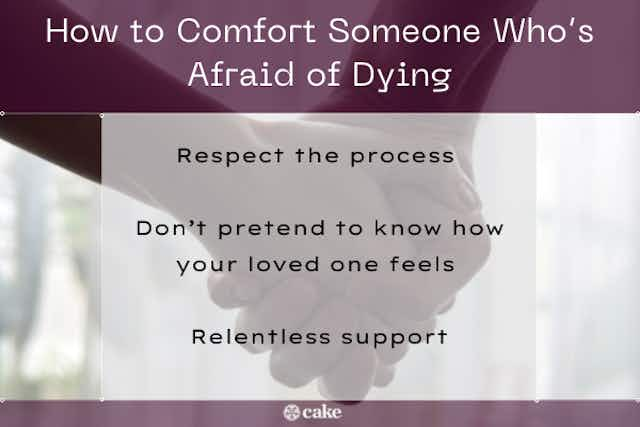

ES
End-of-life care educator and grief worker

SS

Cake values integrity and transparency. We follow a strict editorial process to provide you with the best content possible. We also may earn commission from purchases made through affiliate links. As an Amazon Associate, we earn from qualifying purchases. Learn more in our affiliate disclosure.
You may find it hard to find the right thing to say when a loved one or friend is facing death. The truth is there is no right thing to say, but there are different things you can say.
Is your friend or family member dying in hospice or at the hospital? This may change what you say to your loved one. You might also need to change up your approach, depending on whether your loved one is still processing their death.
Death should be talked about — not avoided. It's not always comfortable at first, but talking to your loved ones about death is important.
The most impactful thing you can do when someone is dying is to practice active listening. When words fail, this is the best way to be there for a family member or friend. Despite your best efforts, you still might struggle to find the words to help comfort a family member or friend who is dying.
Here are some circumstances where you might need guidance.
Post-planning tip: If you are the executor for a deceased loved one, the emotional and technical aspects of handling their unfinished business can be overwhelming. We have a post-loss checklist that will help you ensure that your loved one's family, estate, and other affairs are taken care of.
.png?auto=compress%2Cformat&fit=crop&crop=edges&w=640&q=25)
If your friend or family member has a terminal diagnosis, this can be a heavy reality. Your loved one might still be trying to come to terms with their impending death. Not everyone who is dying will embrace or accept death. Some people have a hard time accepting it — don’t assume your loved one has come to terms with it yet. Instead, it’s possible to meet people where they are in their process and offer compassion and love.
Here are some suggestions for how to talk with a loved one or friend who is dying.
Talking to someone who is dying can feel uncomfortable at times. You may be in shock or have a million questions running through your head. Instead of listening to your loved one who is dying, you may find that it feels easier for you to do all the talking.
Truth is, most nervous talking isn't productive because it removes you from the present moment. People who are dying appreciate it when their loved ones listen to them. They usually want to feel and know that they matter and that they are being heard.
If you are spiritual or religious, you can say a prayer before your loved one’s room and make it a point to be an active listener. Meet them in silence and let your loved one guide the conversation.
It can be easy to fill the silence with meaningless words when you don't know what to say. Allow yourself to be okay with not coming up with the perfect words. This doesn't mean that you care less.
It shows that you are human and your loved one will appreciate that you’re being real. The words will come when they need to — don't try to force them. If you're struggling to find the right words to say, consider offering comfort in the form of a cozy throw blanket or your loved one's favorite snacks on your next visit.
It's human nature to want to correct or fix things that bring us sorrow and sadness. Your loved one's terminal diagnosis might trigger this response.
This is a normal feeling and it is a testament to how much you love and care about your loved one. When you talk to your loved one, try to avoid this in conversation. Let go of an agenda or the need to fix the situation and you’ll free yourself up to be more present for your dying friend or relative.
It's easy to use labels like "dying person" and "healthy person" when a loved one is near the end. You might find yourself avoiding things you would say or trying not to laugh in their presence.
But your loved one is still alive and deserves to experience joy and laughter — the dying process doesn't have to be somber. You can bring light and laughter to your conversations and carry on as you did before.
Create a free Cake end-of-life planning profile and instantly share your health, legal, funeral, and legacy decisions with a loved one.
Getting the news of terminal cancer can feel like a punch to the gut. After months or years of treatment with the hope of beating it, being told that there's nothing else to do is devastating. It can be hard to know how to approach someone who has been given that answer, but we're here to help with four ideas that can work for nearly anyone who has received this news.
Cancer is often a long and difficult journey with years of treatment and months of ups and downs. When treatment is no longer an option and the door closes on the hope of getting better, it doesn't mean the journey is over.
While treatment may stop, many people with end-stage cancer transition to hospice and palliative care for medical assistance that helps them stay as comfortable as possible. This introduces a whole different set of medical routines and life disruptions. Let them know you'll be with them all the way through to the end.
When treatment is no longer an option, doctors will usually give their patients a timeline for how long they have left. Help your friend or loved one maximize their final days on earth by offering to help out in practical ways and taking care of pesky chores on their to-do lists. This will give them more time to spend with friends and loved ones while they can.
Even if the cancer diagnosis is terminal, your friend or loved one might be able to still get around and do things for a while. Sometimes, doing something "normal" is what they need most. Offer to treat them to coffee or lunch to enjoy getting to spend time out together.
Depending on how old they are, your friend or relative might be struggling with the sense that life is getting cut short. Help them focus on the good things in life that they've been able to accomplish instead of the things they may not get to enjoy.
You might be struggling with what to say to a loved one who enters hospice. When a loved one enters hospice, he or she could live a few days or months. If your loved one is no longer responsive, remember that he or she can still hear when you speak. Be as intentional as possible with your words. Here are some suggestions for what to say to someone who’s in hospice.
Let your loved one know you are there for support, however, it’s needed. Show up, listen, and invite your loved one to talk about death as little or as much as he or she wants to.
Your loved one may feel scared or sad about being in hospice and that's common. Let your loved one know that it's okay to be scared — all feelings are valid. With compassion and an open heart, invite your relative or friend to share their fears about death. Remember, you’re there to listen and it's not your job to fix the situation.
If your loved one is in hospice, you may not know how much time you have together. It's important to leave nothing unsaid. Let your loved one know how much you appreciate, love, and care for them.
It is comforting and validating for a dying person to know the impact he or she had on this life. Express your love and allow yourself to be vulnerable with your loved one. Cherish this time and be intentional with your words and actions.
Why save the words for a eulogy or funeral? This is the prime time to share the impact your loved one had on your life. Tell your loved one in person. Share your favorite memories and what he or she means to you and why.
Let yourself express your emotions. Your loved one deserves to know how he or she made you feel. Don't miss this opportunity to share your gratitude for their presence in your life.
An acquaintance is someone who you know but you're not particularly close to. Think of this person as one of the many connections on your social media list who you may not have talked with in a while. If you find out that they're dying, what do you say? Here are a few options for when you say hello or send them a message.
Time or distance may have kept you apart, but this message helps them know that you're still on their team.
Sometimes, the best thing to do is to give an acquaintance a tangible expression of your support. Depending on how ambulatory they are, you could give them a gift card to a favorite restaurant for a night out or a food delivery service for a night in.
Perhaps you're looking to respond to their social media post about their diagnosis. Something short and heartfelt like this is appropriate. If you know they aren't particularly religious, you can change this to say "love and good thoughts" instead.
Acquaintances are often people who we appreciate but, due to time or distance, we rarely tell them to their faces. Use the news of their diagnosis as an opportunity to tell them why you've appreciated them for being in your life, even if it has been at a distance.

Death is one of the most common fears and it's important to approach a fear of death with caution. If your loved one is afraid of death, here are some helpful tips.
Tip: It may be easier to have this conversation after you read a book about death positivity or the experience of dying. We recommend When Breathe Becomes Air by Paul Kalanithi or Advice for Future Corpses (and Those Who Love Them) by Sallie Tisdale.
The fear of death is real and isn't an easy thing to come to terms with. If your loved one is afraid to die and has shared this with you, there's no need to try and fix it. All you have to do is listen.
Listen with no judgment so your loved one feels safe talking with you. Talking with you about it may even lessen your loved one’s anxiety. It’s a big transition and it's important to make space for this. Respect these feelings and let your loved one know you’re there.
Try to avoid statements like "I can't imagine how you feel," or "If I were you, I would feel. " This isn't your death experience and you should avoid making it about you. As a family member or friend, the best you can do is show up and offer unconditional love.
If your loved one fluctuates between acceptance and denial of death, it's okay. Make space for these feelings and be careful not to make any assumptions about how your loved one might feel.
The best thing you can do is show your unwavering support when someone is afraid. Let your loved one know that he or she is not alone and that you’re there every step of the way.
You can offer to coordinate a schedule so that someone is with your loved one at all times if he or she is afraid to die alone.
Visual and auditory hallucinations can accompany the dying process for some people. Depending on the type of hallucination, your loved one might react differently. Some hallucinations, like seeing a spouse who died before them, can give them a feeling of contentment, joy, and comfort. Other hallucinations, however, can cause your loved one to feel scared or uneasy. Here are some tips for navigating this phenomenon.
When visiting with a friend or loved one who is in the end stages of dying, it's important to simply be present with them. Hallucinations can come and go, and in their lucid moments, it goes without saying that they'd rather talk to you than talk to you while you're staring at a screen.
Silence your cell phone and put it away to limit distractions and disturbances. Be present with them and let them know that you're there for them. It might be tempting to distract yourself, but you'll do a world of good by staying beside them during their final hours.
Hallucinations can come in a variety of forms. They might hear something that's not being said or see someone that's not physically present.
If your loved one sees or hears something that causes them concern, try to help reground them in reality by talking with them, holding their hand, and telling them that they're safe. If what they see or hear is a good thing, respond by smiling, speaking in an encouraging manner, or simply witnessing their experience.
It's important to support your loved one by staying calm. Seeing or hearing hallucinations is a normal part of the dying process, and is nothing to become alarmed, agitated, or scared of yourself.
While it can be hard to know what to say to someone who's dying, it's pretty easy to know what not to say. Here is a list of things to avoid when talking to someone who's dying.
Looking for more ways to bring encouragement and comfort to someone who is dying? Here are a few ideas for you.
In light of dying, housework and other menial tasks fall to the bottom of the priorities list. Unfortunately, these to-dos still have to get done. Offer to take care of a chore or two so they don't have to worry about mowing the yard, doing the dishes, or folding the laundry.
Errands take a lot of time, and when time is limited, they become the last thing someone might want to do. Offer to take care of errands like picking up groceries, getting their car washed, filling up the gas tank, or taking their pet to the vet.
Families still need their breakfast, lunch, and dinner, diagnosis or not. Help take the load off by bringing or sending them food. You could order from a favorite restaurant, start a meal train, or provide them with gift cards for a food delivery service.
Sometimes all a person wants is company. Offer to come over to spend time with them and be there during a regular day. Talk, watch TV together, listen to music, sit in the backyard, or watch the sunset. Have no agenda for your visit other than being present and enjoying time together.
If they feel like getting out, offer to take them to coffee or lunch. They may not have a ton of energy, but doing something "normal" can be just what they need when navigating a terminal diagnosis.
Consider giving them a care package, sending flowers, or giving them a gift you know would brighten their day. Take into consideration any limitations (they may not be able to light candles if in a nursing home), preferences (favorite colors and foods), and their personality when choosing the right gift.
If the family needs to be kept in the loop regarding their condition, it can be exhausting to repeat information over and over again. If appropriate, you can offer to be their spokesperson by communicating important information and updates with the family.
Your conversations with dying people are different depending on who the person is. One of the best tools to use when talking with a dying person is to trust and let go. Let go of your agenda to control, fix, or steer the conversation. Second, trust yourself to be able to make conversation with your loved one. The way you carry yourself and show up in conversation will make a big impact.
Envision yourself as a channel for what needs to come through — let your loved one lead the way. This is a sacred transition, so keep in mind that silence is powerful. Finally, trust your intuition and don't be afraid to invite some laughter throughout the process.
If you're looking for more resources, check out our guides on the best books on grief, movies about cancer, and inspiring cancer documentaries.